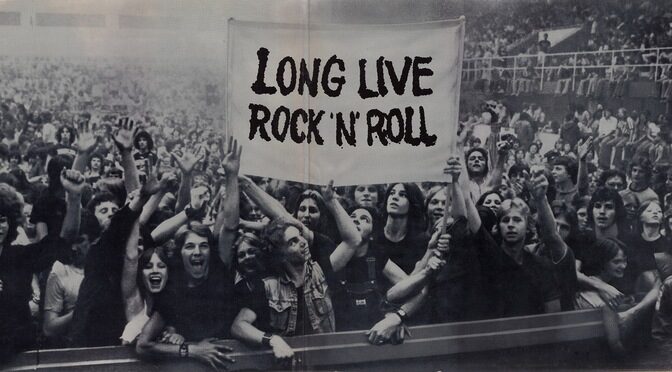In January 2018, rock radio in Chicago met its eschatological fate when K-Love ran the flaming sword of the archangel Uriel through the prostrate body of WLUP. The Loop had first declared itself the city’s loudest radio mouth in the late 1970s, when Steve Dahl burned disco records in a big fuck you to anyone who challenged the white male’s perceived right to be an obnoxious, ignorant clown. The station’s AOR format downshifted into hard rock, and a steady thrum of AC/DC, Def Leppard, Skynyrd, Foghat, and “Get the Led Out” rock blocks blasted from suburban garages, unfinished basements, and cinder block high school weight rooms, eventually traveling through the cocaine and Aqua Net hair metal era and onward to grunge and “active rock,” i.e. lots of Foos and Nirvana. But by the mid-aughts, radio listenership had splintered, coalesced, and splintered again to form into specific micro-demos, and The Loop’s blunt instrument approach was wavering. Its battering ram dulled, the Christians came calling, and with their “positive and encouraging” CCM niche, they squashed the dude rock bug dead. All stop signs, all speed limits; highway to hell, indeed.
Enter Labor Day Weekend, 2020. With the suddenness typical of terrestrial radio moves like this, iHeartMedia flipped its “Big 95.5” modern country format to “Rock 95 Five” and cued up a core playlist of Metallica, Guns N’ Roses, AC/DC, Pearl Jam, Bon Jovi, Green Day, Def, Foo, and Motley Crue. Radio bigwigs described the move as returning ”a key soundtrack to a large lifestyle group,” and white guys aged 25 to 54 driving around Chicagoland in their grey 2003 Ford Mustangs with a vinyl bumper sticker featuring Calvin pissing on a Chevy logo suddenly felt seen again.

The visual branding for “Rock 95 Five” is all blacks, reds, and bold dips, sort of the typographic version of a football lineman who does up his eye black in tragicomic kabuki. A recent playlist scan featured Foreigner’s loutish “Hot Blooded,” “Beautiful People” from Marilyn Manson (a song which reveals its extreme debt to Alice Cooper schlock as it ages), the Foos doing “All My Life,” and Steven Tyler’s lewd scatting on Aerosmith’s “Rag Doll.” A nod toward relative tenderness (or at least an acoustic guitar) came in the form of the Black Crowes’ heroin paen “She Talks to Angels,” and 95 Five finished out the set with the turgid knuckle dragging of Creed’s “My Own Prison,” a song and band where emo is bruised, battered and recast as the singular right of the white male animal to have what are otherwise known as all of the feels. There are no women here. (Maybe Alanis. Maybe.) There are no people of color, aside from a few Hendrix nuggets. And the imaging positioners that drop in between songs exclusively feature a smarmy white male voice shouting stock phrases like “Do you even lift, bro?” and leering that “we’ll melt your face, and melt it good.” A certain kind of male is in control again. As he sees it.
Continue reading WHO MADE WHO: Rock radio, targeted males, and the tyranny of nostalgia











 Andrew WK at Riviera Theatre
Andrew WK at Riviera Theatre